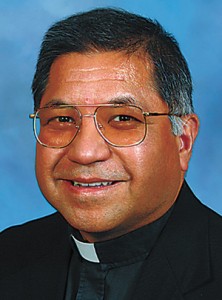By Barb Arland-Fye
The Catholic Messenger
IOWA CITY — In a first for Iowa and the Midwest, immigrants and others living in Johnson County who lack a valid form of ID will be able to apply for a community ID card.
The Johnson County Board of Supervisors voted April 9 to authorize and to fund creation of the ID, which should be available this summer. Center for Worker Justice of Eastern Iowa, founded two years ago, is among supporters of the community ID.

“We were one of the groups that helped spearhead public support for a community ID program and highlight the real need for it,” said Misty Rebik, who leads Center for Worker Justice. “It would not have been possible without the support of the Iowa City Human Rights Commission, the College of Law at the University of Iowa and our affiliates in organized labor and groups of faith,” she added.
“We had about 100 people who marched from the Center for Worker Justice over to the county office building for the vote,” said Father Rudolph Juarez, a member of the organization’s board. He estimates that thousands of people will benefit from a community ID, including 350 or more immigrants who are undocumented. Others who will benefit are individuals with disabilities, senior citizens who no longer drive and people who must leave their homes because of disaster or domestic abuse, for example.
“It’s not the first such program instituted, but the first in Iowa and in the Midwest,” said Fr. Juarez, who also serves as pastor of St. Patrick Parish in Iowa City. “It’s not just for immigrants. It’s for people who have a hard time getting a government-issued picture ID,” he added. “This would be for people who don’t drive, for people who don’t have a birth certificate or people who don’t have the normal access to credentials that other people might have. Most of us take for granted that you have a driver’s license.”
A community ID opens up opportunities to start a bank account, get a debit card, sign a lease, and create a utility account, among other things. Residents with an ID are more likely to report a crime because they won’t have to fear being questioned about legal status, Fr. Juarez said.
Details are still being worked out concerning the documentation applicants must show to receive a community ID, Johnson County Attorney Janet Lyness said. The ID cards will be valid only in Johnson County, one of 22 counties in the Davenport Diocese and 99 counties in Iowa. Cost for set-up and equipment to produce the ID cards is around $20,000, she said.
Johnson County residents are encouraged to get a community ID. Lyness, who served on a committee that developed the ID program, plans to get one. The committee examined community ID programs in cities such as New Haven, Conn., and also researched how the ID program applies to Iowa law.
Lyness said there hasn’t been much pushback on the community ID. “The big thing is people want to make sure that the ID is really that person and that the information is correct.” Supporters also hope the community ID will reduce the crime rate. People feel more comfortable talking to police when they are not in fear of being questioned about their legal status, Fr. Juarez said.
Encouraged by Johnson County’s success, Quad Cities Interfaith is undertaking a campaign to establish a community ID in Scott County. The organization’s Immigration and Racial Justice Task Force held a kickoff April 28. People who want to get involved may attend the next meeting May 26 at 5:30 p.m. at QCI’s office, 601 Brady St., Suite 208, Davenport. Or call the office at (563) 322-4910.

Leslie Kilgannon, QCI’s executive director, said the task force has approached St. Ambrose University, Davenport, about a needs assessment survey for a community ID program. She envisions a coalition of allies who want to see a community ID for Scott County.
The issues that Johnson County residents face without a valid ID are the same issues that impact people here who have to try to survive without an ID, she said. “When you don’t have an ID it’s a huge barrier to services. You can’t get a library card without an ID. You can’t get help at a food pantry without an ID.”
Her goal is to have a community ID available by this time next year. “Now it’s established in the Midwest, in Iowa. In many ways Iowa leads the way on justice issues.”











